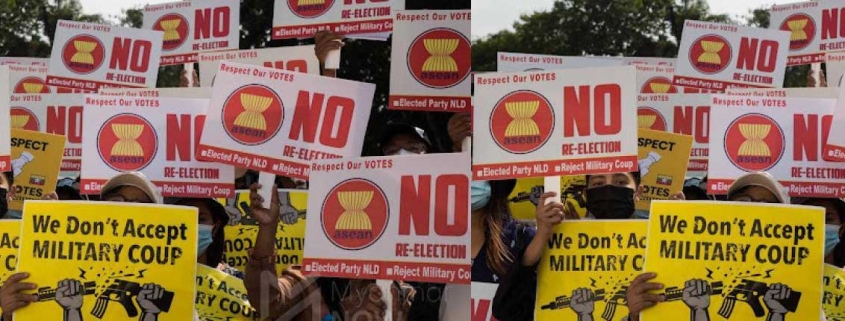Junta’s election commission orders political parties to prepare for financial audit
Some fear the audit will be used as a pretext to disband certain parties
The junta’s Union Election Commission (UEC) has announced plans to audit the financial records of Myanmar’s political parties, a move that has been met with fierce criticism.
The UEC, which officially annulled the results of last year’s election in July, has ordered parties to prepare their financial records for inspection, in what some suspect will be used as a pretext by the junta to disband certain parties.
The commission has not yet set a date for the audit.
Sai Leik, general secretary of the Shan Nationalities League for Democracy, questioned why the UEC would audit finances after officially annulling the election. “Asking for a list of election expenses for each candidate is a pointless act,” he said.
Tha Tun Hla, chairperson of the Arakan National Party (ANP), said that some would find the UEC’s directive difficult to follow because of travel restrictions imposed amid surging Covid-19 cases.
“The political parties that prepared well have no problem,” he said. “But the parties that are not ready to prepare the documents will have to travel.”
He added: “The junta may intend to use the powers enshrined in the Political Parties Act, such as the right to dissolve political parties if they cannot submit their financial statements.”
Parties that fail to comply with certain sections of the Political Parties Registration Law can be suspended for 30 years or permanently dissolved.
Win Maung, the Mandalay Region chairperson of the military-backed Union Solidarity and Development Party (USDP), said his party had not yet been issued any instructions to prepare for an audit.
Ko Ko Gyi, chairperson of the People’s Party, said he did not yet know what the junta’s intentions were.
“It is still unclear whether the military council has made it mandatory for political parties to deal with its UEC, or if it will really take concrete action regarding the financial matters of the parties,” he said.
Tun Myint, an ousted National League for Democracy (NLD) lawmaker, said the party would not follow the UEC’s directive because the junta it serves is illegitimate.
“We do not recognise the UEC formed by the violent military council. There is no reason to react to their instructions,” said Tun Myint, who is also secretary of the Committee Representing Pyidaungsu Hluttaw, which was formed in the wake of the coup by ousted MPs.
Thein Soe, who led the UEC during the rigged 2010 election that brought the USDP to power, was re-appointed as chairperson of the commission after February’s coup.
In May he announced plans to dissolve the NLD, citing unfounded claims by the military that the party had won its landslide victory in last year’s election through voter fraud.
The party’s detained leader Aung San Suu Kyi responded to the announcement via her lawyers by saying the NLD would continue to exist regardless of what the junta did.
The junta has vowed to hold fresh elections and allow the winner to take power, but few have taken this promise seriously, while many in the anti-coup movement say the NLD has already won a legitimate election and should be immediately returned to power.



